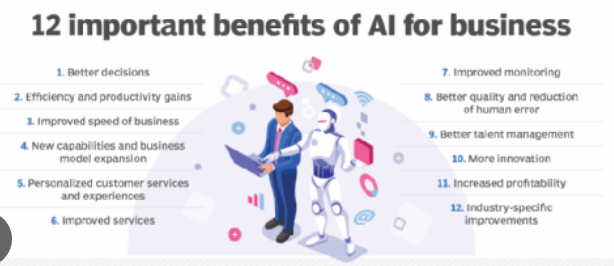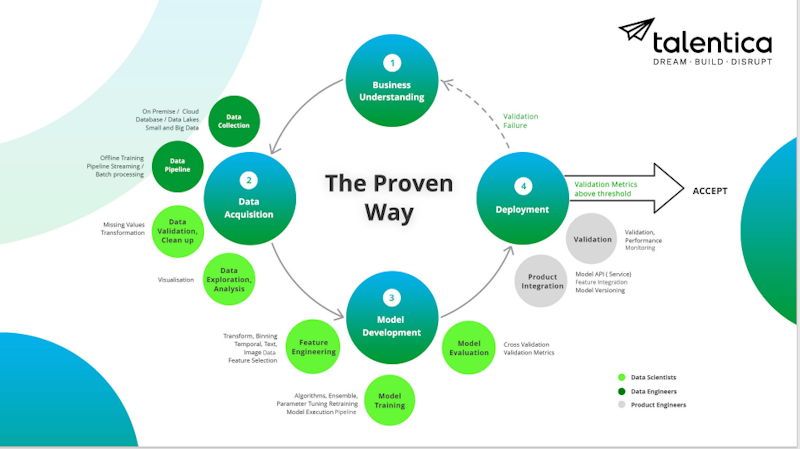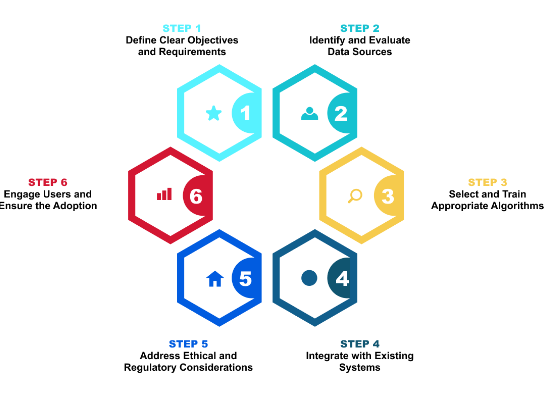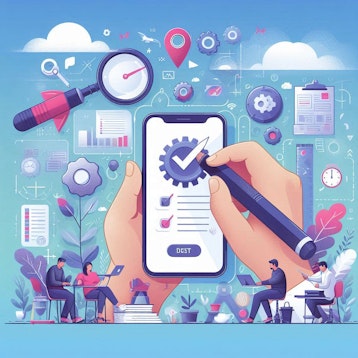Understanding AI at its Basics
Have you ever wondered how machines can think and learn on their own?
That is the magic of Artificial Intelligence (AI), a fascinating blend of technology designed to mimic how humans think and learn. At its heart, AI allows machines to analyze experiences, recognize patterns, and make decisions without human input - be it simple tasks such as sorting emails out, or complex ones such as predicting customer purchases or diagnosing medical conditions - AI has many uses that span its wide array of potential uses - offering us glimpses into a future where technologies think and learn alongside us humans!
Why AI Matters for Your Business
Your business should take note of AI; in today's fast-moving digital environment, AI offers incredible possibilities to businesses of all shapes and sizes. Automation goes beyond automating everyday tasks; it's about revolutionizing how your business functions. AI can transform mundane duties, freeing your team to focus on larger and more strategic goals.
AI can have an enormously positive effect on how customers engage with your services and uncover hidden insights in data that were once beyond reach. By integrating AI into all facets of your business - operations, marketing and customer service - you aren't simply adopting another piece of technology but building it into the fabric of your enterprise. As you venture into AI, remember your aim should not simply be keeping up with tech trends but utilizing these tools in ways that strengthen core offerings and propel your business further forward.

How to Know If You Need AI in Your Organization
Step one in using Artificial Intelligence (AI) effectively in your business is determining its areas of greatest impact. To do this effectively, start by conducting an in-depth examination of all your operations to pinpoint inefficiencies, opportunities for innovation, and customer touchpoints that might benefit from AI enhancement.
Assess Your Business Needs (Part 1)
Starting an AI journey requires a comprehensive assessment of your business's unique needs and challenges. Review operational workflows, customer service protocols, marketing strategies, and core business processes as a starting point. Search for repetitive tasks that consume significant time or resources but could benefit from automation for greater efficiency - for instance, AI can automate data entry, streamline appointment scheduling, or personalize customer communications to name but a few examples of ways AI could make life simpler for businesses.
Equally critical to data analytics' potential is identifying areas where it could provide new insights. Many businesses store large volumes of information but lack the tools to analyze it effectively; AI-powered analytics can revolutionize this process. Learn more about AI's potential in data analytics through Guide to AI Technologies for Business Owners on TechRepublic. AI-powered analytics can sift through it to reveal trends, predict customer behavior, or optimize supply chains - with AI providing tremendous returns in terms of time saved, costs reduced, or new growth opportunities. The key question for business leaders should be asking where AI will add the greatest value - either by saving time and resources, lowering costs, or unlocking opportunities for expansion.
AI Can Have an Impact
Customer Service: Artificial intelligence-powered chatbots and virtual assistants offer round-the-clock customer support, handling inquiries and solving common issues without human intervention - this not only increases customer satisfaction but also frees up your team to focus on more complex queries.
Operations and Supply Chain Management: Artificial intelligence can help your business forecast demand, optimize inventory levels, and enhance logistics planning to meet customer demands quickly and cost-effectively.
Marketing and Sales: With AI, businesses can automate marketing efforts at scale to enhance engagement and conversion rates, driving up customer engagement rates. AI tools can analyze customer data to customize recommendations, content, and promotions according to individual customer preferences.
Human Resources: From resume screening and employee engagement enhancement to turnover prediction and prediction analytics, AI can transform HR processes for greater efficiency and data-driven results.
By carefully assessing your business needs and identifying key areas where AI can help your small business, you can create a firm base for AI implementation.
The next step should involve selecting AI solutions that align with these needs - this decision will be critical to the success of AI initiatives. Remember, AI adoption must advance the business forward by meeting both present challenges and future opportunities head-on.
Planning Your AI Implementation
With a clear understanding of where AI can benefit your business, the next step is strategically planning its implementation. This involves choosing the right AI solutions and developing a comprehensive plan to integrate these technologies into your operations. Success in this phase hinges on careful consideration, meticulous planning, and setting clear objectives.
Choosing the Right AI Solutions
Selecting the appropriate AI technologies for your business is crucial. The market is flooded with a plethora of AI tools and solutions, each promising to revolutionize your operations. To navigate this landscape, Evaluating AI Solutions for Your Business by Gartner offers invaluable insights. To navigate this landscape:
Evaluate Compatibility: Ensure the AI solutions you consider can integrate seamlessly with your existing systems and processes. Compatibility reduces implementation hurdles and accelerates adoption.
Assess Scalability: Your chosen AI technology should be able to grow with your business. It should handle increasing volumes of data and more complex tasks without significant upgrades.
Consider Vendor Support: Look for providers who offer robust support and training resources. Their expertise can be invaluable in smoothing the implementation process and empowering your team to leverage AI effectively.
Analyze Cost vs. Benefit: While evaluating options, weigh the costs against the potential benefits. The most expensive solution isn't always the best, and ROI should be a key factor in your decision.
Developing an AI Implementation Plan
With the right AI solutions identified, crafting a detailed implementation plan is your next move. This plan should outline:
Objectives and Milestones: Set clear, measurable goals for your AI implementation. What specific outcomes do you expect? How will you measure success? Establishing milestones helps track progress and keeps the project on course.
Timelines: Define a realistic timeline for each phase of the implementation. Include time for testing and iterations to refine the AI systems based on real-world feedback.
Roles and Responsibilities: Identify the team members involved in the AI implementation and define their roles clearly. Consider involving a mix of IT professionals, data scientists, and operational managers to cover all bases.
Data Preparation: Outline the steps for preparing your data for AI. This includes data cleaning, integration, and ensuring privacy and security measures are in place.
Training and Change Management: Plan for training your staff to work with new AI tools and manage the change across your organization. Employee buy-in is critical for successful implementation.
A well-thought-out AI implementation plan serves as a roadmap, guiding your business through the complexities of integrating AI into your operations. By addressing these key components, you can ensure a smoother transition to AI-enhanced processes, setting the stage for improved efficiency, innovation, and competitive advantage in your industry.

Preparing Your Business for AI Integration
The groundwork for successful AI implementation lies in preparing your business to embrace these technologies effectively. This preparation involves ensuring data readiness and building a team capable of steering your AI initiatives toward success.
Ensuring Data Readiness
AI's potential is unlocked through data. Ensuring your data is ready for AI is a crucial step, and Data Preparation for AI Implementation on Data Science Central provides a thorough guide on how to achieve this. The quality and organization of your data are pivotal for the success of AI applications. To prepare your business for AI integration:
Audit Your Data: Conduct a thorough review of the data you currently collect and store. Identify gaps, inconsistencies, or areas where data quality could be improved.
Clean and Organize Data: Before AI can be effectively implemented, your data needs to be cleaned and organized. This means removing inaccuracies, duplicates, and irrelevant information to ensure AI models are trained on high-quality data.
Implement Data Governance: Establish clear policies for data management, privacy, and security. AI relies on vast amounts of data, so ensuring compliance with regulations like GDPR or CCPA is critical.
Building an AI-Savvy Team
While AI technologies are powerful, their success depends on the people behind them. Building a team skilled in AI and data science is essential for navigating the complexities of AI implementation. Enhance your team's capabilities by exploring strategies from our article on Building an AI-Savvy Team
Identify Key Roles: Determine the roles required for your AI projects, such as data scientists, AI engineers, project managers, and business analysts. Each plays a unique role in integrating AI into your business processes.
Invest in Training: Not every organization will have immediate access to AI experts. Consider investing in training for your current employees to upskill them in AI-related areas. Online courses, workshops, and certifications can provide valuable knowledge and skills.
Foster Collaboration: AI implementation is not solely a technical endeavor; it requires close collaboration between technical teams and business units. Encourage a culture of innovation and collaboration where team members can contribute ideas and feedback.
Preparing your business for AI integration is a strategic process that involves both technical and organizational readiness. By ensuring your data is primed for AI and assembling a team equipped to tackle AI challenges, you set a solid foundation for the successful adoption of AI technologies. This proactive approach not only facilitates smoother implementation but also enhances the likelihood of achieving your AI objectives, driving your business forward in an increasingly competitive landscape.
Implementing AI in Your Business
With the groundwork laid through careful planning and preparation, the focus shifts to the actual implementation of AI within your business. This phase is where strategic plans are put into action, and AI solutions begin to transform operations. Implementation involves a series of steps, from integration to monitoring, ensuring that AI technologies are effectively adopted and deliver the anticipated benefits.
The Implementation Process
Implementing AI in your business is a multi-step process that requires careful management to ensure success:
Integration: Start by integrating AI solutions into your existing systems and workflows. This may involve technical adjustments to ensure compatibility and may require custom development work to ensure seamless operation. For detailed insights on incorporating AI into specific sectors, our guides on Fintech Design and EdTech Design provide comprehensive overviews of AI's transformative impact in finance and education.
Testing: Before full deployment, conduct thorough testing of AI solutions in a controlled environment. This helps identify any issues or areas for improvement, ensuring that the AI system functions as intended.
Deployment: Gradually deploy the AI solution across your operations. Depending on the complexity and impact of the solution, you may opt for a phased approach, starting with a pilot program before scaling up.
Training: Ensure that relevant staff are trained to use and manage the new AI systems. Training should cover not only how to operate the technology but also how to interpret its outputs and make data-driven decisions.
Monitoring and Iteration: Once deployed, continuously monitor the performance of AI solutions. Collect feedback from users and analyze performance data to identify areas for improvement. AI systems often require adjustments and fine-tuning to optimize their effectiveness.
Overcoming Common Implementation Challenges
Despite careful planning, businesses may encounter challenges during AI implementation. Common hurdles include:
Resistance to Change: Employees may be sceptical or resistant to new technologies. Address this by highlighting the benefits of AI, involving staff in the implementation process, and providing adequate training and support.
Data Issues: Inadequate or poor-quality data can hinder AI performance. Prioritize data management practices and consider external data sources to improve AI outcomes.
Technical Limitations: Some AI solutions may not integrate smoothly with existing systems. Work closely with vendors and IT teams to resolve technical issues and explore alternative solutions if needed.
Cost Overruns: AI projects can become expensive, especially if unexpected challenges arise. Maintain a flexible budget and consider starting with smaller, less expensive projects to demonstrate value before committing to larger investments.
Successfully implementing AI in your business is an ongoing journey. For insights into overcoming common implementation challenges, McKinsey's Overcoming AI Implementation Challenges offers practical advice. that doesn't end with deployment. It's about continually adapting and optimizing AI solutions to meet evolving business needs and leveraging AI's full potential to drive innovation, efficiency, and growth. By anticipating and addressing common challenges, your business can navigate the complexities of AI implementation and emerge stronger in the competitive digital landscape.

Conclusion: Utilizing AI for Business Growth
As we have progressed through this comprehensive journey of AI implementation in your business, from identifying opportunities and strategizing to training your team and integrating, AI has proven its transformative power on businesses of all kinds and sizes. Even after reaching its conclusion, this journey continues with innovation and improvement for businesses of any kind. It's beneficial to consult with experts. Partner with a specialized AI Design Agency to navigate the complex landscape of AI technologies and solutions tailored to your business needs.
Implementing artificial intelligence in your business operations represents a turning point in its development, marking a shift toward data-driven decision-making, operational efficiency, and an enhanced customer experience. But AI implementation alone won't mark its conclusion; innovations and technologies emerge quickly so businesses must remain flexible enough to keep pace with industry trends to remain competitively positioned. Stay ahead of the curve by reading our article on AI UX Research Trend, which discusses the evolving role of AI in UX research and design.
Enforcing AI in your business can be both intimidating and fulfilling, requiring careful planning, preparation, and execution - but its potential rewards in terms of increased efficiency, innovation, and competitiveness could be immense. Leap with AI as your partner on this growth journey; let it lead the way!




